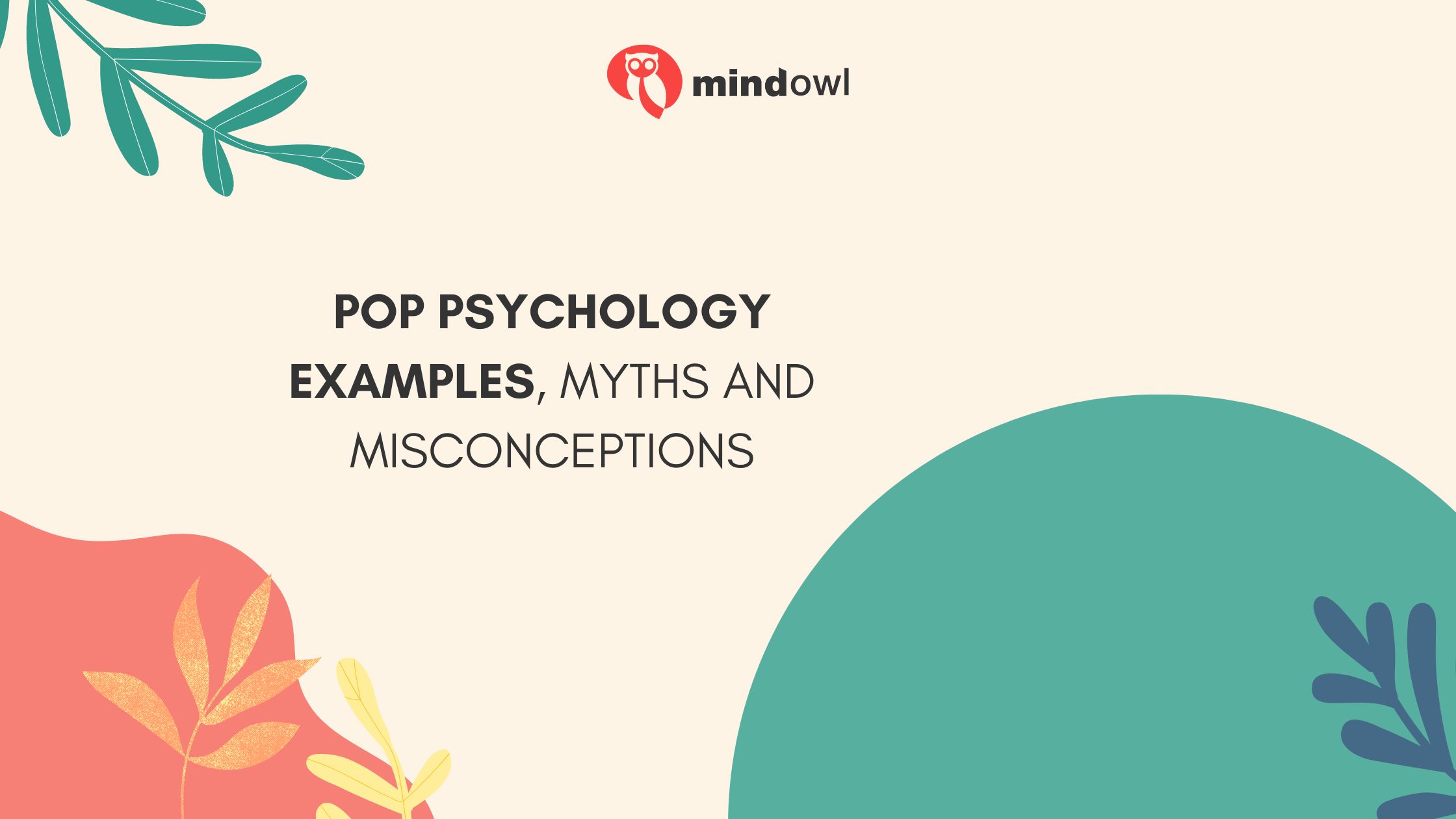
Ever felt bamboozled by those catchy psychological phrases that promise instant happiness or self-improvement? You’ve likely fallen prey to pop psychology, a pervasive phenomenon often packaged as easily digestible truths.
This post will sift through these popular psychology myths and debunk the ones that lack scientific backing. So, are you ready to separate fact from fiction?.
Key Takeaways
- Pop psychology refers to popular psychological concepts and theories that often oversimplify or distort the science of psychology.
- Common examples of pop psychology myths include the belief that smiling always leads to happiness, power posing increases confidence hormones, opposites attract and make better partners, people are more creative in group brainstorming sessions, venting helps overcome anger, left-brained versus right-brained personalities determine traits, humans only use 10% of their brains, subliminal messaging has a powerful impact on behavior and attitudes, and pheromones attract partners.
- Scientific evidence debunks these pop psychology myths. For example, studies show that smiling does not guarantee happiness and there is no scientific proof for left-brained versus right-brained personalities or the 10% brain usage myth.
- It is important to approach pop psychology with critical thinking and skepticism. Relying on scientific evidence helps separate fact from fiction in popular psychological concepts.
What is Pop Psychology?

Pop psychology is a term used to describe popular psychological concepts and theories about human behavior, often oversimplifying or distorting the science of psychology.
Definition
Pop psychology is ideas about our minds and actions that many people know. People sometimes call it “pop psych”. It uses thought from the study of how we think and behave. Often, these ideas sound like they are based on science.
But they can be too simple or not deep enough. Some say pop psychology does not use good science methods. They also believe it makes hard topics too easy to understand.
Characteristics
Pop psychology has certain features that make it stand out. Here they are:
- Pop psychology leans on personal feelings a lot.
- It takes cues from what’s hot and trendy.
- Self – help is big in pop psychology. People use it to try to improve their lives.
- The human potential movement, which believes everyone can reach high levels of mental well – being, shapes a lot of pop psychology.
- Sometimes, pop psychology talks about ideas and problems without any solid science to back them up.
- Some people believe things from pop psychology that are not true.
Common misconceptions
Many people think wrong things about pop psychology. They believe that left-brained people are more logical while right-brained ones are more creative. This is not true at all. The brain works as a whole, and everyone uses both parts.
Also, some folks think different people have specific learning styles. They say some learn best by seeing, others by hearing or doing things hands-on. But research has shown this isn’t quite correct either.
Some popular myths may even hurt us if we believe them too much. For example, many self-help books say that smiling can make you feel happy inside. But it’s not always like this in real life.
Another wrong idea is that people with mental health troubles are often violent or unstable. This is far from the truth as most reactions differ greatly between individuals regardless of their mental state.
Examples of Pop Psychology Myths and Misconceptions

Smiling is believed to be the secret to happiness, but scientific evidence debunks this popular belief.
Smiling is the secret to happiness
Many people think that smiling can make you happy. This is a common pop psychology myth. But, scientific evidence does not back this up. Happiness can make you smile, but a smile doesn’t always lead to happiness.
Power posing increases confidence hormones
Power posing is a term linked with pop psychology. Some people think standing or sitting in a certain way can change how they feel. They believe it makes them seem more confident and sure.
This action, often called “power posing“, may look like standing tall with hands on the hips.
Scientific tests have looked at this idea too. A few studies say power poses may make testosterone go up in the body. Testosterone is a hormone that helps us to feel bold and strong.
The same research says people who do not use power poses might find their testosterone levels drop.
Yet, we need to know these findings are not rock solid yet. More tests are needed before we can bank on them.
Opposites attract and make better partners
Some people think that having a partner who is different from them is good. This belief has been spread by pop psychology. It says those who are very unlike us make the best mates.
But, this idea does not stand up to real study. In fact, one test done in 1993 called it a “toxic belief” for marriage outcomes. Pop psychology often presents this as truth and causes people to believe wrong information.
People are more creative when brainstorming in groups
Lots of people believe a group can come up with more creative ideas. This is a common myth in pop psychology. It says that brainstorming in groups helps to create new and unique thoughts.
But, this is not always true. Many times, people feel pressured in a group. They may follow others’ ideas rather than think on their own. So, they are less likely to share creative ideas.
Also, louder voices can drown out quieter ones in a group setting.
Venting helps overcome anger
Venting anger is a common belief, but it actually doesn’t help in overcoming it. Research spanning over forty years has shown that expressing anger can make things worse. Suppressing emotions and venting both have negative effects on our mental well-being.
Instead of venting, distracting ourselves with unrelated activities and using critical thinking and problem-solving approaches are more effective in dealing with anger. Therapy has also been recognized as an effective way to debunk the myths and misconceptions associated with pop psychology.
So, next time you feel angry, try finding healthy outlets rather than just venting.
Left-brained vs. right-brained personalities
Some people believe that individuals have either a “left-brained” or “right-brained” personality, with creative people being right-brained and analytical people being left-brained.
However, there is no scientific proof to support this idea. While different sides of the brain control certain functions, such as language and visual processing, these functions do not determine our personalities.
The concept of left-brained versus right-brained personalities is an oversimplification that should not be taken as a definitive explanation for how we think and behave.
The 10% brain usage myth
The myth that humans only use 10% of their brains has been around since the 1800s, but it is simply not true. Despite efforts to debunk it, the myth continues to be prevalent in popular culture.
Brain scans have shown that humans actually utilize a significant portion of their brains, not just 10%. There is no scientific evidence to support the claim that we are only using a small fraction of our brain power.
This misconception has been perpetuated in movies, books, and even motivational speeches. It’s important to understand that we use much more than just 10% of our brains in our everyday lives.
Subliminal messaging
Subliminal messaging is a technique that’s often talked about in popular psychology, but its actual impact may not be as powerful as some claim. Research has found that subliminal messages, which are stimuli flashed so quickly that they’re below the threshold of conscious perception, can have a subtle influence on attitudes toward people, objects, and products.
However, the effect of these messages on behavioral intentions is still uncertain. While it’s intriguing to think about the power of subliminal messaging, it’s important to approach this concept with skepticism and consider the limitations of its effects.
Pheromones attract partners
Pheromones are chemicals that animals, including humans, release to communicate with others. While it is believed that pheromones can play a role in mate selection and attraction, it is not a guaranteed method to attract partners.
The science of pheromones is more complex than the myth that they are love potions. Some scientists claim that certain pheromones may have an impact on attracting partners, but it is not a universal phenomenon.
It’s important to understand that the topic of pheromones is often associated with pop psychology misconceptions and misunderstood by the public.
The Truth Behind Pop Psychology Myths
Scientific evidence debunks these pop psychology myths, revealing the importance of critical thinking and skepticism. Read on to discover the truth behind popular misconceptions about psychology.
Scientific evidence debunking these myths
Scientific evidence has debunked the following myths in pop psychology:
- Smiling is not the secret to happiness, according to studies.
- Research suggests that similarity is more likely to attract individuals, contradicting the myth that opposites attract.
- There is no scientific evidence supporting the idea of a “left-brained” or “right-brained” personality.
- The book “50 Great Myths of Popular Psychology” challenges common misconceptions about psychology.
- Studies have found no correlation between power posing and increased confidence hormones.
- Brain imaging research indicates that humans use more than 10% of their brains, debunking the popular myth.
- Subliminal messaging has been shown to have minimal or no effect on behavior or attitudes.
Importance of critical thinking and skepticism
Critical thinking and skepticism play a crucial role when it comes to pop psychology. It is important to approach popular psychological concepts and theories with a skeptical mindset, questioning their validity and seeking scientific evidence to support or debunk them.
Critical thinking allows us to analyze the claims made in pop psychology and separate fact from fiction. By cultivating a healthy dose of skepticism, we can avoid accepting unfounded beliefs as truth and enhance our understanding of the subject.
Researchers in psychology rely on critical thinking skills and skepticism to examine claims objectively before accepting them as valid. This helps in debunking pop psychology myths and improving our overall knowledge in the field.
Impact of Pop Psychology in Daily Life
Pop psychology has had a significant impact on daily life, increasing awareness and interest in psychology. It encourages self-reflection, provides conversation starters, and destigmatizes seeking help for mental health.
Read more to navigate pop psychology responsibly and debunk myths!
Increased awareness and interest in psychology
Pop psychology, with its catchy slogans and simplified explanations, has played a significant role in fostering an increased awareness and interest in the field of psychology. Through books, articles, TED talks, and popular media, people have been exposed to psychological concepts and theories about human behavior and mental life.
This exposure has sparked curiosity and encouraged individuals to delve deeper into the science of psychology.
Moreover, pop psychology has helped normalize discussions about mental health by providing conversation starters and common ground for people to connect over shared experiences. It has also helped destigmatize seeking help for mental health issues by emphasizing the importance of self-reflection and personal growth.
As a result, more individuals are open to exploring their emotional well-being and seeking professional advice when needed.
Encouragement of self-reflection and personal growth
Pop psychology encourages individuals to reflect on their thoughts and behaviors, promoting personal growth. By examining our actions and attitudes, we can gain insights into our strengths, weaknesses, and areas for improvement.
This self-reflection can lead to increased self-awareness and a better understanding of ourselves. It empowers us to make positive changes in our lives and build healthier relationships with others.
Through pop psychology concepts like growth mindset and emotional intelligence, we are inspired to take responsibility for our own well-being and strive for personal development. Self-reflection is a valuable tool that helps us navigate life’s challenges with more resilience, empathy, and fulfillment.
Providing conversation starters and common ground
Pop psychology serves as a way to start conversations and find common ground among people. It allows individuals to connect with others by discussing psychological concepts that are popular and widely known.
Whether it’s talking about the power of positive thinking or analyzing personality traits, pop psychology offers accessible topics that many can relate to. This shared interest in psychological ideas helps foster connections and encourages discussions about human behavior and mental well-being.
Destigmatizing seeking help for mental health
Seeking help for mental health is crucial, but unfortunately, it has been stigmatized in society. This stigma often prevents people from reaching out and receiving the support they need.
However, there are efforts being made to destigmatize seeking help for mental health. Celebrities speaking openly about their own struggles with mental health have played a significant role in breaking down barriers and encouraging others to seek help.
By highlighting the truth about mental health and debunking common myths, we can further contribute to destigmatizing seeking help. Organizations like SAMHSA also provide information to educate and promote understanding around mental health issues.
Navigating Pop Psychology Responsibly
Be open to learning from various sources, cultivate healthy skepticism, share knowledge responsibly, and seek professional advice when needed.
Being open to learning from various sources
To navigate pop psychology responsibly, it is crucial to be open to learning from various sources. This means exploring information from reputable psychologists, academic journals, and scientific research.
It’s also important to seek different perspectives and consider multiple viewpoints on a topic. By being open-minded, we can avoid the trap of blindly accepting popular but potentially misleading ideas in pop psychology.
Instead, we can cultivate a well-rounded understanding by engaging with diverse sources of knowledge and critically evaluating their credibility and evidence-based support. Taking this approach allows us to make more informed decisions about our mental health and personal growth journeys while avoiding pseudoscientific claims that may not have a basis in rigorous psychological research.
Avoiding overgeneralization
Pop psychology often presents generalized or oversimplified concepts. It’s important to avoid overgeneralization because each person is unique and may have different needs. Instead of assuming that one solution fits all, we should consider individual differences and seek out personalized approaches.
By understanding the limitations of pop psychology and being open to learning from various sources, we can cultivate a more informed perspective on mental health and well-being.
Cultivating healthy skepticism
Approaching pop psychology claims with a healthy dose of skepticism is crucial. While pop psychology may seem appealing and offer quick-fix solutions, it is important to question the validity and scientific evidence behind these claims.
Many myths and misconceptions are associated with pop psychology, some of which may unknowingly spread. It’s essential to critically evaluate information, consider multiple perspectives, and seek out reliable sources backed by evidence-based research.
By cultivating healthy skepticism, we can navigate through the noise of pop psychology and make informed decisions about our mental well-being.
Sharing knowledge responsibly
To navigate the world of pop psychology responsibly, it’s important to share knowledge in a responsible and informed manner. This means being aware of the sources you are sharing information from and ensuring they are credible and reliable.
It also involves avoiding overgeneralizations or making claims without scientific evidence to support them. By critically evaluating the information before sharing it, we can help prevent misinformation and misunderstandings from spreading.
If unsure about a particular topic, it’s always best to seek advice from professionals who have expertise in that area. By sharing knowledge responsibly, we contribute to creating a more accurate understanding of psychology for everyone involved.
Seeking professional advice when needed
It is important to seek professional advice when navigating the world of pop psychology. While it can be tempting to rely solely on self-help books or online resources, consulting with a qualified psychologist or therapist ensures that you receive accurate and evidence-based information.
They can provide personalized guidance tailored to your specific needs and help debunk any misconceptions or myths you may have encountered. Seeking professional advice also ensures that you are receiving proper care if you are dealing with mental health issues.
Remember, professionals have the necessary expertise and training to guide you towards true psychological understanding and well-being.
Limitations of “Debunking” Articles
Debunking articles may not always be effective in changing people’s beliefs due to cognitive biases and the backfire effect.
The role of scientists in leading the way forward
Scientists play a crucial role in debunking myths and providing accurate information to the general public when it comes to examples of pop psychology. They use their expertise and research findings to challenge and correct misinformation, ensuring that the field of pop psychology is based on scientific evidence.
Scientists also recognize the risks associated with debunking and provide specific recommendations on how to effectively debunk misinformation without causing unintended consequences.
Their focus is on promoting accuracy, transparency, and evidence-based approaches in debunking articles related to pop psychology myths.
Society’s responsibility in promoting accurate information
Society plays a crucial role in promoting accurate information and debunking myths and misconceptions associated with pop psychology. With the rise of digital media, it is easier than ever for misinformation to spread rapidly.
To counter this, society must prioritize promoting digital literacy skills that help individuals discern between accurate information and fake news. Psychologists are also taking proactive measures by incorporating debunking techniques and critical thinking into their courses.
By encouraging critical thinking and skepticism, society can empower individuals to question popular beliefs and seek out reliable sources of information. Together, we can combat the spread of fake news and ensure that accurate information about psychology reaches the public.
Conclusion
In conclusion, examples of pop psychology show how certain myths and misconceptions can spread through popular culture. It’s important to approach these ideas with skepticism and rely on scientific evidence when seeking knowledge about human behavior and mental life.
By navigating pop psychology responsibly, we can ensure that accurate information is promoted and help debunk misleading claims.
FAQs
Q: What is pop psychology?
A: Pop psychology, sometimes shortened as pop psych, refers to the popularization of psychological concepts and theories through mediums such as self-help books, magazines, and motivational speakers. It is a branch of popular psychology that aims to simplify and present psychological ideas in a way that is accessible to the general public.
Q: What are some examples of pop psychology?
A: Examples of pop psychology include self-help books, motivational seminars, and popular psychology articles that claim to offer quick fixes for various personal and mental health issues. These sources often provide oversimplified explanations and strategies that may lack scientific evidence or validity.
Q: How is pop psychology different from scientific psychology?
A: Pop psychology and scientific psychology differ in their approach and methodology. Scientific psychology is based on rigorous research, experimentation, and peer-reviewed studies, whereas pop psychology often relies on anecdotal evidence, personal experiences, and generalizations. Scientific psychology aims to uncover universal principles and truths, while pop psychology focuses on providing quick solutions and self-improvement techniques.
Q: Are pop psychologists considered legitimate professionals?
A: Pop psychologists, also known as self-help gurus or motivational speakers, are not typically recognized as legitimate professionals within the field of psychology. While they may have personal experiences or insights to share, their advice is often not supported by scientific evidence or peer-reviewed research. It is important to consult qualified and licensed psychologists for accurate and evidence-based psychological support.
Q: What is the self-help industry?
A: The self-help industry refers to a multi-billion dollar market that offers products, services, and resources aimed at individuals seeking personal growth, self-improvement, and mental well-being. It includes books, audio programs, coaching services, seminars, and other forms of media that claim to provide guidance and strategies for achieving success, happiness, and fulfillment in various areas of life.
Q: What are psychological myths?
A: Psychological myths are popular beliefs or misconceptions about human behavior, mental health, and psychological processes that might be spreading through pop psychology or general society. These myths often lack scientific basis or are oversimplified explanations of complex psychological phenomena. It is important to critically evaluate and question common psychological myths to ensure accurate understanding.
Q: What is power posing?
A: Power posing refers to the practice of adopting confident and expansive body postures in order to increase feelings of power, dominance, and self-assurance. This concept gained popularity through a TED Talk by social psychologist Amy Cuddy, but subsequent research has yielded mixed results regarding the effects of power posing on psychological states and behaviors.
Q: What is the history of American psychology?
A: The history of American psychology dates back to the late 19th century when the discipline began to establish itself as a scientific field of study. Influenced by European schools of thought, such as structuralism and functionalism, American psychologists started developing their own theories and methods. Notable figures in the history of American psychology include William James, John Dewey, and B.F. Skinner.
Q: How does pop psychology impact society?
A: Pop psychology can have both positive and negative impacts on society. On one hand, it can inspire individuals to pursue personal growth and self-improvement. It may also raise awareness about mental health and encourage people to seek help when needed. However, pop psychology can also perpetuate unrealistic expectations, promote oversimplified solutions, and dismiss the complexity of psychological issues.
Q: Is pop psychology accurate and reliable?
A: Pop psychology is often criticized for its lack of scientific evidence and rigor. While some concepts and strategies promoted in pop psychology may have some validity, it is important to approach them with skepticism and critical thinking. To ensure accurate and reliable information, it is recommended to rely on scientific research and consult qualified professionals in the field of psychology.
Q: So how would I tell if something was real scientific advice or just “pop”?
When reading any resource related to applied psychological methodologies available outside professional circles -such as a course or salesmanship guide- ensure they validate their facts using established psychological theories confirmed by trusted bodies within the field; whether that be Clinical Psychology studies backed up by American Psychologists’ insights, or reliable Education research supported clearly through relevant data points.
MindOwl Founder – My own struggles in life have led me to this path of understanding the human condition. I graduated with a bachelor’s degree in philosophy before completing a master’s degree in psychology at Regent’s University London. I then completed a postgraduate diploma in philosophical counselling before being trained in ACT (Acceptance and commitment therapy).
I’ve spent the last eight years studying the encounter of meditative practices with modern psychology.

